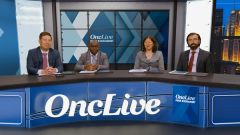
LAGOON and IMFORTE Trials: Data Updates and Expert Insights
A review of the LAGOON and IMFORTE trials with expert insights regarding the potential clinical implications of current and future study findings.
Episodes in this series

Transcript:
Taofeek K. Owonikoko, MD, PhD: Do you think we are in a place where we can use that to inform some of the ongoing trials now? LAGOON was presented at this meeting, it is still in progress, for those in our audience who may not be following the field very closely. Lurbinectedin has accelerated approval; there’s no full approval yet. But despite that, the promising activity, as we’ve heard, has now led to additional trials being done. The LAGOON trial is building on the experience of the combination of irinotecan with lurbinectedin, which almost doubled the response rate you would’ve expected with lurbinectedin alone. Hopefully, with the LAGOON design, we are going to have better insight into full-dose, single-agent lurbinectedin, lurbinectedin with irinotecan with a reduced dose of lurbinectedin vs investigators’ choice of control, whether that’s topotecan or irinotecan. I think one thing about that study that’s quite interesting to me was the chemotherapy-free interval that was required for only 30 days. This is going to allow a lot of platinum-refractory patients to be enrolled in the trial, which I think is reasonable, given what we’ve seen in the basket trial with lurbinectedin. But it’s still a lot to wait for. More than 700 patients will be enrolled in that trial, so it’s still maybe a couple of years out from now.
The other thing about lurbinectedin, or any of these other promising agents in the second line and beyond is the goal is always when we find an active agent that we move it forward, we bring it into the frontline setting. Unfortunately, we’ve not been successful in doing that with any of the agents we’ve tested in the second line, whether it’s topotecan, whether it’s irinotecan. Bringing them as a replacement strategy in the front line hasn’t worked out. Maybe the maintenance phase now, where we have maintenance immunotherapy, could be a way for us to gradually get this agent into the frontline regimen. The IMforte trial, I think is trying to do that, which is a large phase 3 trial where patients with newly diagnosed extensive-stage disease will complete the induction phase of treatment. And if they don’t progress, then at the time of maintenance, they’re randomized to continue with atezo [atezolizumab], or you add lurbinectedin to atezolizumab. It’s still an ongoing trial. We don’t have any data yet, but at least conceptually, I think that is a way to move the field forward, to bring an active drug into the earlier stages of treatment and potentially add more benefits to what you would’ve gotten with just maintenance immunotherapy.
It’s very difficult when we talk about maintenance, what would be sufficient enough for us to change our practice? The question is always, are we just, as we mentioned, maybe adding 1 or 2 months to the median [survival], or are we able to raise the tail of the curve? With this type of cytotoxic approach, I will be more interested in what the response rate will be. It was surprising with the S1929 trial of talazoparib, that if you just look at the number numerically, not that it has any statistical significance, there were more patients with responses in the atezolizumab-only arm compared to those who got atezolizumab plus talazoparib. There was a patient here and there where it made a difference. It was quite instructive to see that. But I would expect that in this setting, where we know that lurbinectedin does have measurable objective response improvement in the second-line setting, we’re going to want to see if this is going to translate into a benefit for the patient.
Transcript edited for clarity.







































